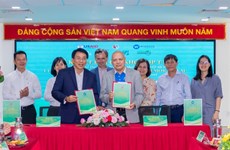Mekong Delta asked to develop urban areas adaptive to climate change
The Mekong Delta region should develop urban areas that are adaptive to climate change, while intensifying access to official development assistance (ODA) used to respond to this phenomenon.
 Illustrative image (Source: VNA)
Illustrative image (Source: VNA)Sea level rises, caused by climate change, have increased flooding in the region – especially in urban areas. Flood levels in An Giang province’s Tan Chau town in 2011 were 20cm lower than in 2000, while the level in Can Tho in 2011 was 20cm higher than in 2000.
Luu Duc Cuong, Deputy Head of the Vietnam Institute for Urban and Rural Planning under the Ministry of Construction, warned that the region’s average sea level will increase by 23 to 27cm by 2050, and 59 to 75cm by 2100. At that time, more than 3 million hectares of land in the region will be submerged more than 0.5m under water, of which 2.4 million hectares, accounting for 60 percent of the region’s total area, will be more than 1m under water.
Can Tho and its neighbouring Vinh Long province will be affected the most.
According to Cuong, during the rainy season the Mekong Delta’s urban areas face difficulties draining all the water.
He suggested the region reduce its concentrated development. It should build reservoirs, canals and pipelines connecting to big reservoirs and dykes to prevent flooding.
Nguyen Hong Thuc from the Research Institute for Settlements stressed that as the nation’s strongest agro-fishery and forestry region, the Mekong Delta should classify and develop agricultural urban areas, including urban fishery areas, urban agricultural services areas, urban forestry areas and urban sea and island areas.
It is essential for the region to develop smart areas in order to respond effectively to climate change, the official said.
Meanwhile, Pham Quoc Viet, Deputy Head of the Economic Department under the Steering Committee for the Southwestern Region, suggested the Mekong Delta prioritise addressing regional, inter-regional and cross-sector issues in its socio-economic development plans.
He asked for intensified connectivity between localities in urban development to proactively respond to climate change, as well as their appropriate use of natural resources in urban planning.
The Mekong Delta contributes roughly 50 percent of the country’s total food output and over 90 percent of rice exports every year. Aquaculture accounts for over 60 percent of output and 80 percent of export, while the livestock industry brings the country 1.5 to 2 billion USD per year.-VNA













